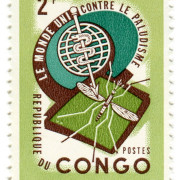- Science News
- Featured news
- World Mosquito Day: How the pest’s diet could lead to discovery of new antimalarial drug
World Mosquito Day: How the pest’s diet could lead to discovery of new antimalarial drug
By Suzanna Burgelman/ PhD student and fellow Trizah Koyi Milugo, ICIPE

PhD student and fellow Trizah Koyi Milugo. Image: Trizah Koyi Milugo
A preventable disease, malaria still threatens millions of people around the world. World Mosquito Day raises awareness about malaria and its transmission via mosquitos. Researchers such as PhD student Trizah Koyi Milugo focus their research on malaria control and prevention and, in her case, is researching the development of a novel tool for controlling malaria transmission.
In 2019, 229m clinical cases of malaria occurred and 409,000 people died of the disease, most of them children in Africa. The disease is found in more than 100 countries worldwide, but roughly 70% of the world’s malaria burden is concentrated in Africa and India.
Humans get infected with the malaria virus through mosquito bites. Other than malaria, mosquitos carry an array of dangerous diseases, such as dengue, zika, and west Nile virus. Mosquitos are the world's deadliest creature. World Mosquito Day raises awareness about the dangers of mosquitos and the devastating consequences of malaria.
Trizah Koyi Milugo, a PhD student at the International Center of Insect Physiology and Ecology (ICIPE), is currently researching the development of a novel tool for controlling malaria transmission and recently published a paper in Frontiers in Tropical Diseases.
As an open access publisher, Frontiers has several research topics focused on malaria research. For World Mosquito Day, Frontiers is launching a new research topic: Mosquitoes and Their Role in Disease Transmission: Recent Advances and Innovations.
Because open access and sharing research is part of Frontiers’ mission, we want to give researchers the voice to express themselves and their research with more creativity and freedom than they otherwise would have in publishing an academic paper.
If you’ve recently published your paper with Frontiers and believe you have a great story to tell, then send an email to press@frontiersin.org with ‘Frontier Scientists’ and your name in the subject line.
What inspired you to become a researcher? Do you have any specific memories that set off a spark?
I was born and raised in western Kenya, a malaria endemic region. As a child, I suffered several bouts of malaria and this might have motivated me to pursue a career in science to seek ways to fight the disease. However, growing up I did not know exactly how to go about achieving my dream and I confess that at some point the desire to pursue scientific research dwindled. Plus, in the rural area where I grew up, I did not have role models to look up to and neither was there internet connectivity to access online resources.
My first experience with research came in the final year of my undergraduate studies at the University of Nairobi where we were tasked with designing a research project. My project was aimed at evaluating the anti-inflammatory effect of selected medicinal plants. This exposure sparked my interest in natural product chemistry and became the genesis to my current career path.
Can you tell us about the research you’re currently working on?
It is well known that the parasites that cause malaria in humans are transmitted by bites of infected female Anopheles mosquitoes. Chemotherapeutic agents that prevent parasite spread among the human population have been proposed as a new way to fight malaria. Previous studies conducted at ICIPE have revealed that parasitized mosquitoes tend to feed preferably on specific plants species.
This observation has led to the idea that infected mosquitoes perhaps feed on these plants to ‘self-medicate’ of malaria parasite infections ie, block establishment and transmission of the malaria parasites through the mosquito. This hypothesis is supported by findings indicating that compounds from specific mosquito host-plants can in fact, to varying degrees, reduce the parasite burden within the mid-gut of the mosquito.
I joined the research team led by Prof Baldwyn Torto at the Behavioral and Chemical Ecology Unit in ICIPE in 2018 to work on a project that is aimed at modifying the chemical structure of the artemisinin-like compound parthenin. This helps generate new compounds that can prevent establishment of Plasmodium parasites in the mid-gut of infected mosquitoes. This compound is a key metabolite of the invasive weed Parthenium hysterophorus, also known as famine weed, that the malaria vector Anopheles gambiae preferentially feeds on in nature for sugars. This weed has spread all over east Africa and a potential threat to recent malaria control gains.

Image: Trizah Koyi Milugo
In your opinion, why is your research important?
For decades, the search for new antimalarials has focused mainly on molecules that can cure humans of malaria. Only recently have scientists begun to think about ‘curing mosquitoes’ of the parasites. Based on their feeding preferences, mosquitoes can help us identify plants with metabolites that have anti-plasmodial activity. This approach presents a promising direction to unearth new antimalarials to contribute to malaria control towards elimination efforts.
Are there any common misconceptions about this area of research? How would you address them?
I am not aware of any misconceptions so far. Plant feeding is rarely viewed as pivotal in malaria epidemiology. However, recent research is highlighting that it is a critical resource commonly exploited by even the most efficient malaria vectors that prefer to bite humans. In fact, it is an understudied area yet with huge potential to impact malaria control.
For decades the search for new antimalarials has focused mainly on molecules that can cure humans of malaria; only recently have scientists begun to think about ´curing mosquitoes´ of the parasites.
Trizah Koyi Milugo
What are some of the areas of research you’d like to see tackled in the years ahead?
A key area of research that I would like to see addressed in the future is the development of control measures to prevent the spread of famine weed and other invasive plants in malaria endemic regions. Also, future studies should aim to screen non-invasive malaria vector preferred host plants for compounds with anti-plasmodial activity.
How has open science benefited the reach and impact of your research?
I have benefited from wider readership and this is evident by the number of recommendations, citations and downloads I have received regarding articles published in open access.
If you have recently published your research with Frontiers and believe you have a story to tell, then you might feature as part of our new Frontier Scientists series! Send an email with the subject line ‘Frontier Scientists’ and your name to press@frontiersin.org , as well as details on what your most recent research was about.







